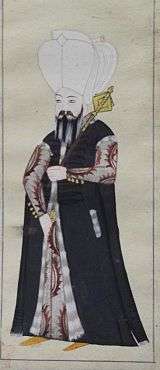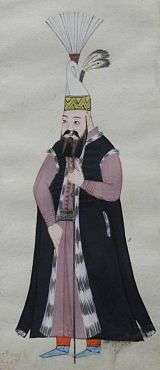Çavuş
Çavuş, also anglicized Chaush and Chiaus[1] (from Turkish: çavuş / چاوش, "messenger"), Arabic 'shawish, شاويش'[2], (from Old Turkic chabush or chawush , "person who gives order, person who yells")[3] was an Ottoman title used for two separate soldier professions, both acting as messengers although differing in levels.[4] It was a rank below agha and kethüda (from Persian, kad-khuda, "magistrate"), in units such as the Janissaries and Sipahi, and was also a term for members of the specialized unit of çavuşān (چاوشان, also çavuşiyye,[5] çavuş(an)-i divan(i)[4]) consisting of combined cavalry and infantry serving the Imperial Council (as in Ottoman Egypt).[5] The leaders of the council's çavuş were titled çavuşbaşı / چاوش باشی (or başçavuş / باش چاوش).[6] The çavuşbaşı was an assistant (or deputy) to the Grand Vizier,[7] dealing with security matters,[8] accompanying ambassadors visiting the Grand Vizier,[4] and also carried out the first examination of petitions submitted to the Council, and led council meetings when the Grand Vizier was not present.[8] The title has its origin in Uyghur use, where it was the title of ambassadors, and then entered Seljuq use for Byzantine imperial messengers, and Persian and Arabic use for various court attendants.[4]


The word gave rise to surnames, such as Çavuş (Turkish), Çavuşoğlu (Turkish),[9] Čaušević (Serbo-Croatian),[10] Čaušić (Serbo-Croatian),[11] Baščaušević (Serbo-Croatian),[12] Çaushaj (Albanian), Ceaușu (Romanian), Ceaușescu (Romanian), and others. It is also the stem of place names, such as Çavuş (in Turkey), Çavuşlu (in Turkey), Çavuşlar (in Turkey), Çavuşköy (in Turkey), Çavuşbayırı (in Turkey), Čauševac (in Bosnia),[13] Čauševići (in Bosnia[14] and Serbia), Čaušev Do (in Bosnia),[12] Čauševina (in Bosnia),[12] Čaušlije (in Bosnia),[12] Čaušlija (in Macedonia), Chavusy (in Belarus),[15] Çaushi (in Albania), and others. In the past in former Yugoslavia, the word čauš was also sometimes applied to the wedding-planner.[12]
List of çavuşbaşı
- Daut Bey (fl. 1484), served Sultan Bayezid II (r. 1481–1512)[16]
- Kuyumcu Süleyman Agha, served Grand Vizier Ipşir Pasha (1653–54)[17]
- Mehmed Raşid, served Sultan Mahmud II (r. 1808–1839)[18]
- Mustafa Agha
- Ahmed Agha
- Selim Pasha
- Zulfiqar Agha
- Mohammed Haji-Ajvazade
- Abdul Kerim Izet
Modern Turkish military usage
In the modern Turkish Armed Forces, the rank of Çavuş is equivalent of "sergeant" (and NATO OR-5 rank), and ranks above the rank of Onbaşı ("corporal"). The insignia is two inverted chevrons, in red or camouflage pattern, depending on the dress.
See also
- Tzaousios, Byzantine title
- Chaush (India), Muslim community
References
- "Chiaus". Merriam-Webster.
- https://www.almaany.com/ar/dict/ar-ar/%D8%B4%D8%A7%D9%88%D9%8A%D8%B4/
- "*Etimoloji: Kökenbilim, kelimelerin aslını ve evrimini inceleyen disiplin ~ EYun étymon "asıl" + logeía "bilim"". Nisanyansozluk.com. Retrieved 2017-06-30.
- Stein 2007, p. 84.
- Wilkins 2010, p. 122.
- Başaran 2014, p. 186, Holt 2013, p. 238, Stein 2007, p. 84
- Başaran 2014, p. 186, Stein 2007, p. 84
- Başaran 2014, p. 186.
- İbrahim Aksu (2006). The Story of Turkish Surnames: An Onomastic Study of Turkish Family Names, Their Origins, and Related Matters. Olay Gazete Press. p. 42. ISBN 978-9944-5163-0-3.
- Rječnik 1882, p. 916, Ujević 1942, p. 207
- Šimunović 1995, p. 10.
- Ujević 1942, p. 207.
- Rječnik 1882, p. 916, Ujević 1942, p. 207
- Rječnik 1882, p. 916, Ujević 1942, p. 207
- Jan Karłowicz. Imiona własne polskich miejsc i ludzi od zatrudnień. Warszawa, 1887. p. 5.
- Zbornik za istoriju, jezik i književnost srpskog naroda: Spomenici na srpskom jeziku. 1. odeljenje. 1934. p. 352.
- Evliya Çelebi (1991). The Intimate Life of an Ottoman Statesman, Melek Ahmed Pasha (1588-1662): As Portrayed in Evliya Celebi's Book of Travels (Seyahat-name). SUNY Press. pp. 129–. ISBN 978-0-7914-0640-3.
- Albert Hourani; Philip Shukry Khoury; Mary Christina Wilson (1993). The Modern Middle East: A Reader. University of California Press. pp. 45–. ISBN 978-0-520-08241-0.
Sources
- Başaran, Betül (2014). Selim III, Social Control and Policing in Istanbul at the End of the Eighteenth Century: Between Crisis and Order. BRILL. pp. 186–. ISBN 978-90-04-27455-6.CS1 maint: ref=harv (link)
- Holt, P. M. (2013). Studies in the History of the Near East. Routledge. pp. 238–. ISBN 978-1-136-27331-5.CS1 maint: ref=harv (link)
- Šimunović, Petar (1995). Hrvatska prezimena: podrijetlo, značenje, rasprostranjenost. Golden Marketing. p. 10. ISBN 978-953-6168-16-3.CS1 maint: ref=harv (link)
- Stein, Mark L. (2007). Guarding the Frontier: Ottoman Border Forts and Garrisons in Europe. I.B.Tauris. pp. 84–. ISBN 978-0-85771-313-1.CS1 maint: ref=harv (link)
- Ujević, Mate (1942). Hrvatska enciklopedija. 4. Konzorcija Hrvatske enciklopedije. p. 207.CS1 maint: ref=harv (link)
- Wilkins, Charles L. (2010). Forging Urban Solidarities: Ottoman Aleppo 1640-1700. BRILL. pp. 122–. ISBN 90-04-16907-5.CS1 maint: ref=harv (link)
- Rječnik hrvatskoga ili srpskoga jezika. U knížarnici L. Hartmana na prodaju. 1882. p. 916.
External links
| Look up çavuş in Wiktionary, the free dictionary. |
| Wikimedia Commons has media related to Çavuş. |
| Wikimedia Commons has media related to Çavuşbaşı. |